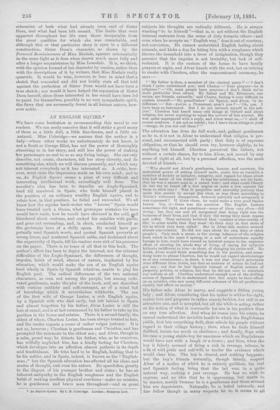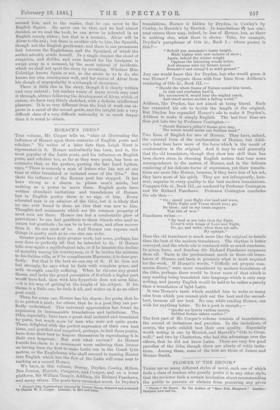AN ENGLISH SQUIRE.*
WE have some hesitation in recommending this novel to our readers. We can easily conceive that it will strike a good many of them as a little dull, a little fine-drawn, and a little un- natural. Miss Coleridge—we assume that the author is a lady—whose other works we unfortunately do not know, is not a Scott or George Eliot, has not the power of thoroughly absorbing us in her story, and still less the power of making her personages as real to us as any living beings. She can only describe, not create, characters, tell her story cleverly, and do something else, which we will discuss presently, and which may not interest everybody as it has interested us. A critic, how- ever, must state the impression made on his own mind ; and to us, An English, Squire seems a piece of very difficult and interesting intellectual work, exceedingly well done. The novelist's idea has been to describe an Anglo-Spaniard, "bred till manhood in Spain, who finds himself placed in the position of an ordinary wealthy English squire, and to relate how, in that position, he failed and succeeded. We all know how the regular hack-writer who "knows" Spain would have treated such a theme, what grotesque mistakes his hero would have made, how he would have shivered in the cold, Ind blundered about customs, and cooked his eatables with guile, and gone out serenading, and, in short, conducted himself as the grotesque hero of a chilly opera. He would have per- petually used Spanish words, and quoted Spanish proverbs at wrong times, and muttered Spanish oaths, and declaimed about the superiority of Spain, till his readers were sick of his presence on the paper. There is no trace of all that in this book. The author's effort has been to depict the internal, not the external .difficulties of the Anglo-Spaniard, the differences of thought, impulse, habit of mind, almost of nature, implanted by his education, which would make the son of an English squire bred wholly in Spain by Spanish relatives, unable to play his English part. The radical differences of the two national characters, as seen not among the people, but among culti- vated gentlemen, make the plot of the book, and are described with curious subtlety and self-restraint, as of a mind full of knowledge which it nevertheless withholds. The sou of the first wife of George Lester, a rich English squire, by a Spanish wife who died early, but left behind in Spain and almost forgotten by his father, Alvar Lester is still the heir of entail, and is at last summoned by his father to take up his position in the house and estates. There is a second family, the eldest of whom, Chariton Lester, has been always treated as heir, and the reader expects a scene of rather vulgar jealousy. It is not so, however ; Cheriton is gentleman and Christian, and has prompted the summons to the eldest son ; and Alvar, though in a calm, proud way, he detests his father, who, as ho conceives, has wilfully neglected him, has a kindly feeling for Cheriton, which developes into an affection almost pathetic in its depth and trustfulness. He tries hard to be English, holding that to he his m6tier, and in Spain, indeed, is known as the "English- man ;" but the Spanish education has affected all his ideas, and modes of thought, and even his nature. He speechifies, greatly to the disgust of his younger brother and sister ; he has an inherent antipathy to the English roughness and the English habit of making needless physical exertions—make no mistake, he is gentleman and brave man throughout—and on great * An Eng1i411 spirs. By C. B. Coleridge. London ; Sampson Low.
subjects his thoughts are radically different. He is always wanting " to be himself "—that is, to net without the English internal restraint from the sense of duty towards others—and even when he accepts an " English way," does it out of courtesy, not conviction. He cannot understand English feeling about animals, and kicks a dog for biting him with a roughness which throws the household into a fever of indignation, though they perceive that the impulse is not brutality, but lack of self- restraint. It is the custom of the house to have family prayers at night, and Alvar kneels with the rest, but on retiring to smoke with Cheriton, after the unaccustomed ceremony, he says :—
" ' My father is then, a member of the clerical party F' —' T don't think I quite understand you,' said Cherry.—' Your prayers—he is religious P'—' Oh, most people have prayers—I don't think we're more particular than others. My father and Mr. Ellesmere, our rector, are friends, naturally,' said Cherry, feeling it very difficult to explain himself.—' My grandfather' (in Spain), said Alvar, 'is in- different.'—' But—you're a Protestant, aren't you Oh, yes. I have been so instructed. But I do not interest myself in the sub- ject.' Chariton had heard many odd things at Oxford said about religion, but never anything to equal the navetd of this avowal. He was quite unprepared with a reply, and Alvar went on,—' I shall of course conform. I am not an infidel; but I leave those things to your —clergy, do you not call them F'"
The education has done its full work, and, gallant gentleman as he is, it is not in Alvar to understand that religion is per- sonal, and unconnected with party ; that duty is of supreme obligation, or that he should even try, however slightly, to be anything but himself. Cheriton perceived the failure, not without a certain shame, for to him Alvar, not moved by any sense of right at all, but by a personal affection, was the most devoted of friends :—
" Why should not Alvar' s gentleness, honour, and courtesy, his undoubted power of setting himself aside, make him as valuable a member of society as industry, integrity, and regard for those about him had made of his father ? It was his misfortune, not his fault, that he was a square man in a round hole ; and what could Cherry do but try to round off a few angles or poke a few corners for them to stick into ? Was it prejudice and unworthy jealousy that made him unable to accept this view, or was there something in Nettle's vehement disapproval, however unkindly and arrogantly it was expressed P If Alvar chose, he could make a very good Squire Lester. Yes, if—there was the question. The English Linters sometimes did right, and sometimes—some of them very often—did wrong ; but they one and all recognised that doing right was the business of their lives, and that if they did wrong they must repent and suffer. They certainly believed that conduct is nine-tenths of life,' in other words, that they must do their duty in that state of life to which they were called.' But in Alvar this motive seemed almost non-existent, He did not care about his own duty or other people's. Only such a sense, or the strong influence of the religion from which in the main it sprang, or a sort of enthusiasm equally foreign to him, could have roused an indolent nature to the supreme effort of altering his whole way of living, of caring for subjects hitherto indifferent to him—in short, of changing his entire self. No doubt, Alvar would think something duo to his position, and some- thing more to please Cheriton, but ho would not regard shortcomings as of any consequence ; in short, it was not that Alvar' s principles were different from theirs, but that as motives of action he had not got any ; not that he had Spanish instead of English notions of property, polities, or religion, but that he did not care to entertain any notions at all. Cheriton understood enough now of the shifting scenes of Spanish life to understand that this might be their effect on an outsider, who saw many different schemes of life all produce an equally bad effect on society."
His father asks Alvar to marry, and suggests a fitting young lady ; and Alvar, considering that his father is within his right, makes love and proposes in rather stately fashion, but still in an attractive one, and is accepted, but all the while is acting rather on his notion of what is convenable for one in his position than on any true affection. And when he comes into his estate, he cannot understand the invisible bonds to which the Englishman yields, first lets everything drift, then selects his people without regard to their village history ; then, when he finds himself disliked, insists too much on obedience ; and finally, flogs with his cane a young stable-boy for sauciness which an Englishman would have met with a laugh or a frown ; and then, when the boy is falsely accused of firing a rick in revenge, refuses, in a fit of wild pride and self-will, to tender the evidence which would clear him. The boy is cleared, and nothing happens ; but the boy's friends naturally, though falsely, suspect Alvar of a malice of which he is entirely guiltless, his real and Spanish feeling being that the lad was, in a quite natural way, seeking a just revenge. He has no wish to oppress, and no idea that he is oppressing, but wants to be master, merely because he is a gentleman and those around him are dependents. Naturally, he is bated intenaely, and fine fellow though in many respects he is, it seems to all
around him, and to the reader, that he can never be the English Squire. He never can be that, and we had almost decided, as we read the book, he can never be tolerated in an English county either ; but that is a mistake. Alvar will be Alvar to the end; but there is another side to him, the Spanish, though not the English gentleman, and there is one permanent link between the Englishman and the Spaniard, of which the Author adroitly avails herself. In a single chapter the cloud of suspicion, and dislike, and even hatred for the foreigner, is swept away in a moment, by the most natural of incidents, which we shall not spoil the story by revealing. Whether Miss Coleridge knows Spain or not, as she seems to us to do, she knows her own countrymen well, and her rescue of Alyea from his slough of unpopularity is a triumph of cleverness.
There is little else in the story, though it is clearly written and very natural ; but readers weary of many novels may read it through, always following the development of Alvar, which, of course, we have very thinly sketched, with a definite intellectual pleasure. It is so very different from the kind of work one ex- pects in a novel of the second grade, and the insight into a very difficult class of a very difficult nationalty is so much deeper than it is usual to obtain.



































 Previous page
Previous page